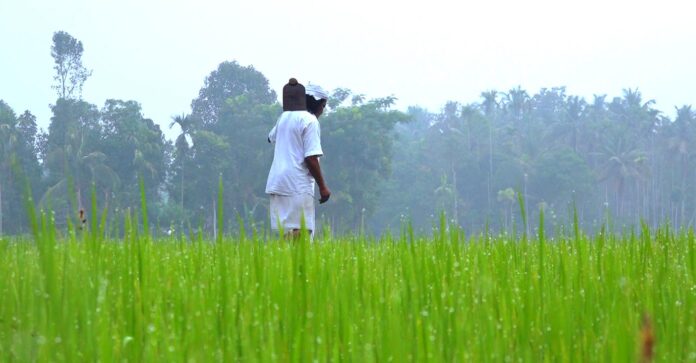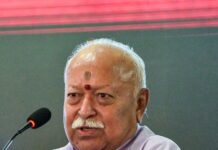The Government of India has recently honoured Shri. Cheruvayal K. Raman, a tribal farmer from Kerala, with one of the highest civilian awards in Bharat (India), the Padma Shri. The septuagenarian farmer from the Wayanad (or Vayal Nadu, i.e., the land of paddy fields) district of Kerala was honoured with the Padma Shri for his vital contributions to the field of agriculture. Cheruvayal Raman (known locally as ‘Vithachan’/ father of seeds), is credited with conserving over 55 indigenous rice varieties of the district, many species of trees, spices, and herbs.
By Sarada Subhash
Apart from the Padma Shri, he has also won many other recognitions and awards like the prestigious National Plant Genome Saviour Award instituted by the Protection of Plant Varieties and Farmers’ Rights Authority, Ministry of Agriculture and Farmers’ Welfare, India. Popularly recognised as the “Guardian of Native Paddy” and Bharat’s “living paddy gene bank,” Cheruvayal Raman is also fondly referred to as Ramettan by the natives.
According to a 2020 Down to Earth report, though the cultivation of paddy “has occupied a pride of place” in Kerala, its cultivation has been dwindling at a disturbing rate. The report further states that Kerala has “lost 70 percent of its paddy fields in the past 30 years”. For instance, Wayanad district had earlier produced almost 160 varieties of paddy, but now 55 varieties out of these are extinct. The Hindu reported that Kerala’s “area under rice cultivation (wetland) fell to 1.94 lakh hectares in 2021-22, a decrease of 3.9% compared to 2020-21”. Another critical concern highlighted by India Narrative is that the farmers in Wayanad, who once grew indigenous/native rice varieties, have switched to genetically modified and high-yielding seeds over time, causing a “serious threat” to the native varieties that “faced extinction”. This is where the initiatives of Cheruvayal Raman become significant, with him taking efforts to preserve the age-old methods of sustainable cultivation, using indigenous varieties of paddy, that were common amongst the Adivasis of Wayanad.
Introduced to farming at a young age, Cheruvayal Raman saw a time when not just the farmers, but government as well as policymakers also introduced genetically modified and high-yielding seeds to prioritise the increase of food production, writes Bobins Abraham for Indiatimes. Gradually Ramettan realised that in this process, more traditional varieties were disappearing. So, he started to meticulously collect native paddy seeds from many regions of Wayanad. For the past two decades he has been collecting and sowing various indigenous rice varieties on his 3-acre plot in Kammana village, Wayanad. This includes varieties of paddy that are aromatic, those that have medicinal values, and some that are capable of withstanding floods, media reports. The indigenous rice varieties saved by Cheruvayal Raman in the last 20 years include Thondi, MannuVeliyan, Kanali, Chembakam, Chettuveliyan, Palveliyan, Channalthondi and the aromatic types like Jeerakasala, Gandhakashala and Kayama (India Narrative, 2022). Apart from the conservation of paddy seeds, he conducts various studies on water, soil, paddy seeds and the growth patterns of these seeds, writes Lekshmi Priya S. for The Better India.
What are the struggles/obstacles he had to face along the way? The experienced farmer in him is quick to point out the increasing impact of climate change and the loss of forest cover in Wayanad. Talking to First Post in 2016, Ramettan put out a timely warning when he said – “the ecological system of Wayanad has gone for a toss. Things have gone out of control now. Wayanad used to be different from other districts because of the biodiversity”. He also adds, – “the government should devise policies for the indigenous cultivation methods. Only individuals won’t do….I incur huge losses for preserving this. I lose around Rs 20,000-30,000 yearly for preserving the indigenous seeds.” In a conversation with Hari Tulsidas, a Sustainable Natural Resource and Energy Advisor at the United Nations Economic Commission for Europe (UNECE), Ramettan poignantly reminds us that the importance of these indigenous seeds transcends beyond their purpose as sources of food by also critically representing “our cultural heritage”.
Behind his steadfast resolve and thoughtful nurturing of the State’s indigenous and ancient paddy diversity lies his larger concern for the future generations of our country Cheruvayal Raman says he and his family endeavour to “conserve the seeds as a treasure for the next generation”. Having built a sizeable collection of indigenous paddy seeds and organically cultivating varieties by himself, Ramettan also encourages his fellow farmers to follow the same practice by giving away these seeds for free – the only condition being that these farmers should return the same quantity to him after the harvest. To propagate this objective, he has also established a farmers’ network via an “informal seed distribution mechanism”. Why this unique specification? To this Ramettan responds by saying that “seeds cannot be sold because it is love and care rather than a commodity” . He is also eager to impart his repository of knowledge to those interested. “My knowledge and learning is out there for everyone, and I will always keep my doors open for those with the heart to learn, “ says Cheruvayal Raman.
This article first appeared in www.vifindia.org and it belongs to them.






